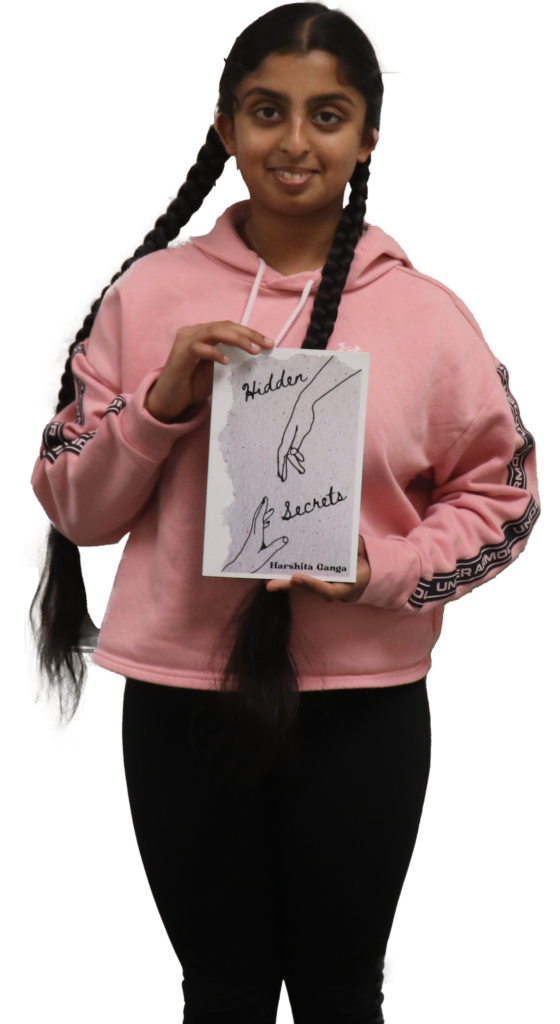Ganga writes book to raise awareness

Risha Chada | The Chronicle
Freshman Harshita Ganga has combined her passion for writing and autism awareness in her quest to become a published author.
Freshman Harshita Ganga recently published her book “Hidden Secrets” on Amazon. After thinking about ways to increase autism awareness, Ganga decided to combine that desire with her passion for writing. Ganga said she wrote the book in part to bring awareness to autism, but also in honor of her cousin Bhoomika, who has Rett syndrome, a rare neurodevelopmental disorder that is classified as an autism spectrum disorder.
“I think I started writing it because I had an interest in writing, but the main reason I wrote what I did is because I [felt] I needed to bring a lot of attention to autism,” Ganga said. “My cousin with Rett syndrome [Bhoomika] also lives in Texas, and because of that distance, we rarely get to see each other, so I always cherish the moments that we have with each other and wanted to write something for her.”
Everyone has doubts about pursuing new things, and Ganga was no stranger to them as she published her book. Throughout her writing and revising processes, Ganga said it was extremely difficult to move past worrying about how others would perceive this book.
“There were many times where I kept thinking ‘this sounds nothing like something someone would ever read’ or ‘this is nothing like the books I read,’” Ganga said. “It took me a long time to find the words that I wanted.”
While Ganga struggled with finding the right words to convey her story, she was also highly critical of herself during this process. Always one to push herself further, Ganga said she never felt like her story was good enough.
“At first, I was really scared about publishing because I kept thinking ‘I could do better on this,’” Ganga said.
Another hurdle Ganga faced was not being able to interview her cousin for the book. Left with a decision to make about how autism was portrayed in her story, Ganga turned to the scientific research she completed prior to writing her story. Ganga said she did not want to group everyone on the autism spectrum into one category or create a stereotype because every kid is different.
“I tried to stay away from describing [the character with autism] too much because I felt like I didn’t want to describe him in a way that was inaccurate,” Ganga said.
One of the biggest difficulties Ganga faced was staying committed to her book. With her schedule filled with high-level classes and after-school clubs and activities, Ganga found herself with less time to dedicate to her book. In order to accomplish her goal to get “Hidden Secrets” published, Ganga said she had to create a rigid schedule for herself.
“The main problem with writing a book is definitely commitment,” Ganga said. “In order to get [Hidden Secrets] finished, I had to sit down every day for 30 minutes and think ‘I’m going to just write for these 30 minutes [without] getting distracted.’”
Although Ganga faced many obstacles while writing her book, the experiences she has had allowed her to get through it. Ganga regularly competes in events where she is under tremendous stress to learn or memorize or complete a task efficiently and said she believes that this helped her to meet her page goals.
“I knew I wanted to finish the book and it kept me motivated to set myself a goal to do a certain amount every week so that I could get it done,” Ganga said. “It was the sort of stress level that I would have before competitions like Science Olympiad [events], and I felt like that prepared me because I knew what cramming the night before was like.”
More than the self-imposed goals and Science Olympiad competition experience, Ganga’s love for her cousin, Bhoomika, really helped her finish the book. Throughout her childhood, Ganga visited her cousins who lived in Texas and would chat and play with them. As they grew older, however, Bhoomika’s health worsened, and Ganga said that the times they shared was one of the main reasons she wrote “Hidden Secrets.”
“I remember when I was ten, [my family] traveled to Texas and [Bhoomika] had this tube that we put into her mouth to give her [food],” Ganga said. “And I remember I would [help] put that tube in and [would] play with her because she wasn’t in a wheelchair yet. Those experiences showed me that, despite the way that other people look at her, she’s still the same person with the same feelings.”
Photo by Risha Chada
